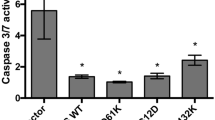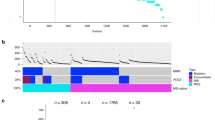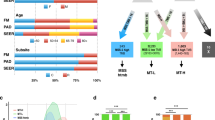Abstract
Tyrosine kinases, which are important regulators of intracellular signal-transduction pathways, have mutated forms that are often associated with oncogenesis and are attractive targets for therapeutic intervention. Recently, systematic mutational analyses of tyrosine kinases revealed that a minimum of 30% of colorectal cancer contain at least one mutation in the tyrosine kinases. To further explore these mutations, we examined all reported mutations of NTRK3, FES, KDR, EPHA3, NTRK2, JAK1, PDGFRA, EPHA7, EPHA8, ERBB4, FGFR1, MLK4 and GUCY2F genes in the 24 colorectal cancer cell lines. Unexpectedly, among 24 colorectal cancer cell lines, only two cell lines (LoVo and CaR1) harbored mutation C1408T (R470C) in MLK4 gene. The mutation rate was extremely low compared to that previously reported. Therefore, we analyzed mutations in 46 colorectal cancer samples resected from the same number of Japanese patients. Surprisingly, none of the 46 samples contained any of the mutations reported. Based on our study, we advise that a more comprehensive tyrosine kinase gene mutation assay is necessary in the future.
This is a preview of subscription content, access via your institution
Access options
Subscribe to this journal
Receive 50 print issues and online access
$259.00 per year
only $5.18 per issue
Buy this article
- Purchase on Springer Link
- Instant access to full article PDF
Prices may be subject to local taxes which are calculated during checkout
Similar content being viewed by others
References
Bardelli A, Parsons DW, Silliman N, Ptak J, Szabo S, Saha S et al. (2003). Mutational analysis of the tyrosine kinome in colorectal cancers. Science 300: 949.
Blume-Jensen P, Hunter T . (2001). Oncogenic kinase signalling. Nature 411: 355–365.
Davies H, Bignell GR, Cox C, Stephens P, Edkins S, Clegg S et al. (2002). Mutations of the BRAF gene in human cancer. Nature 417: 949–954.
Samuels Y, Wang Z, Bardelli A, Silliman N, Ptak J, Szabo S et al. (2004). High frequency of mutations of the PIK3CA gene in human cancers. Science 304: 554.
Shao RX, Otsuka M, Kato N, Chang JH, Muroyama R, Taniguchi H et al. (2005). No mutations in the tyrosine kinases of human hepatic, pancreatic, and gastric cancer cell lines. J Gastroenterol 40: 918.
Smith G, Carey FA, Beattie J, Wilkie MJ, Lightfoot TJ, Coxhead J et al. (2002). Mutations in APC, Kirsten-ras, and p53 – alternative genetic pathways to colorectal cancer. Proc Natl Acad Sci USA 99: 9433–9438.
Velho S, Oliveira C, Ferreira A, Ferreira AC, Suriano G, Schwartz Jr S et al. (2005). The prevalence of PIK3CA mutations in gastric and colon cancer. Eur J Cancer 41: 1649–1654.
Acknowledgements
We thank Mitsuko Tsubouchi for technical assistance, and we are also grateful to many colleagues for the helpful discussions during the course of this work. This work was supported in part by the Grants-in-aid for scientific research from the Ministry of Education, Culture, Sports, Science and Technology of Japan.
Author information
Authors and Affiliations
Corresponding author
Rights and permissions
About this article
Cite this article
Shao, RX., Kato, N., Lin, LJ. et al. Absence of tyrosine kinase mutations in Japanese colorectal cancer patients. Oncogene 26, 2133–2135 (2007). https://doi.org/10.1038/sj.onc.1210007
Received:
Revised:
Accepted:
Published:
Issue Date:
DOI: https://doi.org/10.1038/sj.onc.1210007
Keywords
This article is cited by
-
Dysregulated PDGFR alpha expression and novel somatic mutations in colorectal cancer: association to RAS wild type status and tumor size
Journal of Translational Medicine (2020)
-
MLK4β functions as a negative regulator of MAPK signaling and cell invasion
Oncogenesis (2012)
-
Different subtypes of intraductal papillary mucinous neoplasm in the pancreas have distinct pathways to pancreatic cancer progression
Journal of Gastroenterology (2012)



